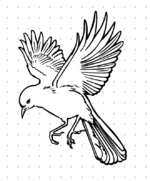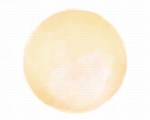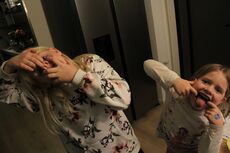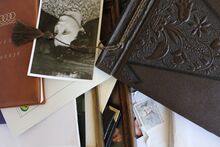Final text on practice by Yalou: Difference between revisions
| (One intermediate revision by the same user not shown) | |||
| Line 58: | Line 58: | ||
My graduation project was in collaboration with WORM. The story was experienced through multiple senses; visuals, audio, and taste. Where the audience moved through different spaces to taste, see, hear, do, and most importantly, actively experience the story. | My graduation project was in collaboration with WORM. The story was experienced through multiple senses; visuals, audio, and taste. Where the audience moved through different spaces to taste, see, hear, do, and most importantly, actively experience the story. | ||
[https://www.youtube.com/watch?v=ylcKCUdLx7U&t=96s Watch the video on | [https://www.youtube.com/watch?v=ylcKCUdLx7U&t=96s Watch the video on the Cocaine trading routes from Brazil to Rotterdam.] | ||
| Line 101: | Line 101: | ||
=== The Eye === | === The Eye === | ||
After the reflections, I choose to be closer to the ground and focus on my interests and surroundings. And I knew what my film would be about: | After the reflections, I choose to be closer to the ground and focus on my interests and surroundings. And I knew what my film would be about: | ||
Latest revision as of 15:20, 8 March 2023
From journalism to visual art
"I have many plans, but I won't be able to carry them all out anyway, because human life is finite." (Elek, 2010)
I am a Journalist.
This journey of becoming a journalist was difficult for me. As I see beauty in sharing the true fruits of this humanized world.
I have always looked for the boundaries between art and journalism. This path has been previously explored but has yet to be widely accepted within the journalistic field.
But what makes me a professional journalist?
I went through some old study books to find an answer:
"A professional journalist independently engages in the gathering, processing, and disseminating current, relevant, and verified information to a wide audience. He can justify his methods and act on journalistic ethics. Via which platform this information is distributed is not important." (Nico Kussendrager, 2014)
I would rewrite it as: "As fluid as the world is, it is up to the bird to independently spread what is floating on these humanized waves of the world. The bird will know the destination the fluid waves go to and ensure it arrives as it should. The bird will justify its flight routes and fly as the core of the existence of birds was meant to fly. But it does not matter which ocean or sea the fluid waves will roll, as long as the bird knows where to go."
My passion is beyond the book. I saw opportunities in my journalistic practice that would express my stories in a much fruitier, more profitable, and brother way.
I positioned myself on that border of Journalism and Art. And I started to knot the tree branches from one side to the branches on the other side. When I looked up into the sky and saw these beautiful but critical journalistic birds flying around.
I heard birdsongs in the sky:
"Why would you use these experimental ways?"
"We don't understand it."
"This is not art school. This is journalism school."
But I remembered that I had to listen to the smaller birds who flew with me along the way. And helped me to knot the tree branches together and to make them fit into the birds' world.
As my wings were forming, I felt my inner body become fluid:
The first spread of covid through the act of eating.
After my search for these crossed-over borders, I started to create. One of my first works was "The spread of Covid-19". The audience had to eat a bat-shaped dumpling while communicating and reflecting on every movement they made.
I made the birds become birds.
The birdsongs were silent and not intent on being heard by me. As I dressed up the educators in pieces of plastic. They were positioned in front of a high-standing desk. On this desk, there was edible polluted sushi and written questions. The lights turned off, and the birds started watching "The Northern Fulmar; the face of our plastic use" on several screens while eating their polluted sushi.
Watch the video on the Northern Fulmar; the face of our plastic use.
The cocaine trading routes from Brazil to Rotterdam.
My graduation project was in collaboration with WORM. The story was experienced through multiple senses; visuals, audio, and taste. Where the audience moved through different spaces to taste, see, hear, do, and most importantly, actively experience the story.
Watch the video on the Cocaine trading routes from Brazil to Rotterdam.
This interest in using food as a storytelling tool was significant to me. It showed me that food could be a narrative. That culinary branches can be knotted to journalistic branches. It confirmed that the different practices strengthen each other. Here a few of my inspirations who spoke:
"Where food is used to craft a narrative for empowered Asian American woman." (Dorsey, 2019)
"What am I eating? Where is it from? Who is growing it? Awareness is a starting point for a conversation." (Barber, 2019)
"There are other disciplines that we can draw on for inspiration." (Achatz, 2019)
After graduating, I took this ideology with me. As I was left with a lot of knotted branches. It was time to find a place where I could give myself the space to grow my own artistic practice. So I found this place where I can develop my fly techniques and my fluid forms.
"Lens Based Media."
A fluid playground where I am surrounded by so much talent and inspiration.
The first weeks were like the ocean, filled with reflecting waves:
"You are very objective."
"How do the stories relate to you as a person?"
"Talk with your work and take time to see everything."
"Search a topic or story that is closer to you."
"Just start creating, and have fun with it."
"You don't need the full story to start creating."
"Do something that you haven't done yet."
When I look back at the reflection on the waves, this is where I needed to be.
I haven't been here for that long, but I have grown and shaped so much.
My wings belong in the reflection of the waves.
The Eye
After the reflections, I choose to be closer to the ground and focus on my interests and surroundings. And I knew what my film would be about:
"Religion."
This choice is connected to my childhood. I felt a certain safety and peace whenever I felt connected to religion. Visiting churches, speaking to nuns, or even watching it on television felt meditative. I come from an unreligious background and had never touched a bible before, so these thoughts and feelings weren't thought. No, I was only left with my own imagination and the visualization of God in paintings.
Because of that, my mind connected sunlight to God:
"If there is a God out there, he must be the sun."
I immediately had a vision for my film: the connection between the sunlight and nuns.
Sadly, after some unsuccessful calls with nunneries, I had to review my plan.
I talked about my struggles and ideas at a family dinner in November. My brothers' girlfriend (Roos) started talking about her family and her religious background: A Christian family. She no longer believed, but her older sister (Lies) did. Roos offered to ask her sister if I could film her family. And that was the start of the film.
The final film "Oh My Sun"
An interview with Lies's daughters about their religion and religious imagination. And connect this to my childish visualization of God, ignorance, and discomfort with religion.
These were the film stages:
1.My introduction to the Christian religion. I started reading the bible, and I began to go to different churches.
Build a connection. I first got to know the girls to make a connection and explained to them what the project was about.
2.Finding the best film environment. Reflect on different ways of speaking to the girls. Finding an exciting but comfortable way to film them. I decided to film in their own home.
3.The interview questions. I thought of questions that could be answered by many. The questions needed to be objective. But they were also challenging and could be answered in various ways.
4.The day of filming. After buying some arts and crafts, I went to their home to film in the afternoon.
5.Editing of the film. The editing process went from a journalistic interview to an abstract film.
6.The final edit. It was an abstract film of the interview. My goal is to give enough space in the film to make a connection with the girls. And I wanted to avoid steering in any direction. Thereby, the girls already provide a lot to the feeling of the film. In the film's second half, the viewer connects with the maker.
While making this film, I used journalistic techniques to gather information. But the final visualization is more abstract and artistic.
I found my path towards my artistic practice.
It reminds me of the start of my journalism studies. I was convinced that art and journalism could strengthen each other, and I am still sure about that.
Watch the EYE film "Oh My Sun"
My next flights
Although I finished the EYE project. This is the beginning of my journey as an artist. I arrived at this borderless place that I had seen before. It is time to spread my wings and dive deep. So I want to create and see more as an artist in the upcoming months and years.
My next project is about my grandmother and the Hungarian refugees from 1956 who fled to Holland. For now, I plan this project for my graduation.
I also want to look around more. And find more artists who can inspire me and fit into my practice and vision.
I will spread my wings with my fluid body to plant the seeds of these borderless trees.
References
Achatz, G., 2019. Chef's Table Grant Achatz [Interview] 2019.
Barber, D., 2019. Chef's Table [Interview] 2019.
Dorsey, J., 2019. Chef Uses Food to Spark Diologue About Asian American Issues [Interview] (07 2019).
Elek, J., 2010. Elek Judit: A mindenkori felejtés ellen [Interview] (20 09 2010).
Nico Kussendrager, D. v. d. L. B. V., 2014. Basisboek Journalistiek. sl:Noordhoff Uitgevers.
See here a mindmap of the text. In the mindmap the text is not yet in its final stage, but still good to see:







